“Ali se pescou por anos e anos… de pai para filho, de filho para neto, de neto para bisneto, e assim foi… muita família viveu do mar… viveu-se tanto do mar que já não há peixes como antigamente… o pescador agora é pintor, caseiro, pedreiro ou seja lá o que for… mas para pescador, bom mesmo é viver do mar!
Foi então que chegaram uns doutores e limitaram o mar… fizeram uma tal de reserva biológica marítima… lá não se pode mais pescar… lá é lugar de estudo, de pesquisa, de doutor ficar.
Mas não é que, como não se podia mais pescar, cresceram peixes e outros bichos do mar… lá os peixes são grandes, do jeito que era antigamente… eu quero ir lá pescar, mas se lá, eu e todo mundo for, de novo, os peixes vão acabar…”
“They fished there for many, many years… from father to son, from son to grandson, from grandson to great-grandson and so on… many families lived off the sea…they lived off the sea so much that now there are not as many fish as before… fishermen are now painters, guards, bricklayers or whatever they can… but for a fisherman, what really matters, is to live off the sea!
And then along came some professors and closed off the sea… they created something called a marine biology reserve… you can’t fish there anymore… it’s a place for studying, for research, for professors to stay.
Turns out that, since you couldn’t fish there anymore, fish and other sea creatures reappeared… the fish there are big, the way they used to be… I want to fish there, but if I and everybody else go there, again, there will be no fish left…”
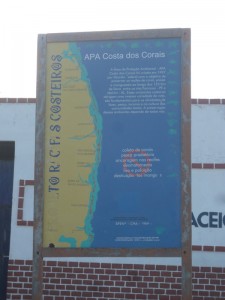 O trecho acima resume de forma bastante romântica a relação entre a criação da Reserva Biológica Marinha de Tamandaré com a comunidade de pescadores do município. Conversamos com pesquisadores, mergulhadores, pescadores e voluntários sobre a visão da comunidade local, em especial dos pescadores, da restrição imposta pela criação da reserva biológica marinha para fins de conservação dos recifes de coral e dos projetos desenvolvidos nesta área.
O trecho acima resume de forma bastante romântica a relação entre a criação da Reserva Biológica Marinha de Tamandaré com a comunidade de pescadores do município. Conversamos com pesquisadores, mergulhadores, pescadores e voluntários sobre a visão da comunidade local, em especial dos pescadores, da restrição imposta pela criação da reserva biológica marinha para fins de conservação dos recifes de coral e dos projetos desenvolvidos nesta área.
In quite a romantic way, the passage above summarizes the relationship between the creation of the Tamandaré Marine Biological Reserve and the local fishing community. We talked with researchers, divers, fishermen and volunteers about how the local community, in particular the fishermen, sees the reserve. To conserve the coral reef and develop scientific projects in this area, the creation of this reserve has imposed many restrictions on its users.
Um destes projetos nos chamou atenção: o projeto do Instituto Recifes Costeiros (IRCOS) que visa a capacitação de guias turísticos locais para exploração turística de baixo impacto ambiental da área do entorno da reserva fechada. IRCOS espera aumentar o apoio da comunidade local à área restrita. O projeto tenta oferecer uma atividade alternativa à pesca predatória que leva a redução ou eliminação de algumas espécies de peixes. Este projeto nos chamou a atenção porque é um exemplo claro que a conservação da natureza é sempre mais eficaz se inserida no contexto local.
One of these projects caught our attention: set up by the “Instituto Recifes Costeiros” – IRCOS (Coastal Reefs Institute) it aims at training local tourist guides for sustainable tourism in the area around the reserve. IRCOS hopes to increase support for the reserve by the local community. The project tries to involve in particular the fishermen by offering them an alternative to uncontrolled fishing that threatens the reef ecosystem. We especially liked this project because it clearly demonstrated that conservation efforts are much more effective when inserted into the local context.
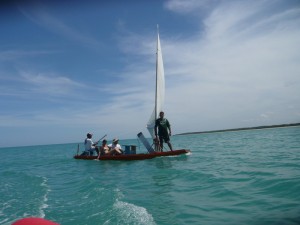 Tivemos o privilégio de conhecer o projeto servindo de turistas cobaias. Enquanto apreendíamos, fizemos passeio de jangada com Sr. Rubens, mergulhamos nas áreas do entorno e nadamos nas piscinas naturais. Tudo isto cercado da beleza de um lugar como Tamandaré, onde até a praia feia é de impressionar os olhos!
Tivemos o privilégio de conhecer o projeto servindo de turistas cobaias. Enquanto apreendíamos, fizemos passeio de jangada com Sr. Rubens, mergulhamos nas áreas do entorno e nadamos nas piscinas naturais. Tudo isto cercado da beleza de um lugar como Tamandaré, onde até a praia feia é de impressionar os olhos!
We had the privilege of getting to know the project as “guinea pig” tourists. While we were learning, we went on a jangada (traditional fishing raft) trip with Sr. Rubens, dove in the area around the reserve and swam in natural pools. We did all of this, surrounded by the beauty of a place like Tamandaré, where even the ugly beach is an eyeful.
A Reserva Biológica Marinha de Tamandaré foi criada em 1997 como parte do Projeto Recife Costeiros que visava a recuperação e reprodução dos recifes de coral da região. Esta reserva marinha é um dos tipos mais restritos de unidade de conservação categorizadas pela lei brasileira. Nela são permitidas somente a pesquisa científica e atividade educacionais. Todas as outras atividades estão proibidas. Esta reserva está inserida na Área de Preservação Ambiental (APA) da Costa dos Corais e compreende 1% de sua área total, cerca de 413 mil hectares e 136 km de extensão.
The Tamandaré Marine Biology Reserve was created in 1997 as part of the Coastal Reef Project. This project aimed at recovery and reproduction of the region’s coral reefs. This type of reserve is one of the most restrictive conservation units that exist in Brazilian environmental law. Only scientific research and educational activities are allowed in them. All other activities are forbidden. This reserve covers 1% of a Coral Coast Environmental Preservation Area (APA), which extends over around 413 thousand hectares and is 136 km long.
Os ecossistemas de Recife de Corais são uma espécie de floresta marítima contendo o mais diverso habitat marinho do mundo, abrigando quantidades extraordinárias de plantas e animais. Em Tamandaré e em vários pontos da área abrangida pela APA, a pesca excessiva e predatória, o desenvolvimento e ocupação costeira, o lixo, o desmatamento, entre muitas outras coisas causaram a degradação desses ambientes. A Reserva Biológica Marinha é uma importante tentativa de manter este ambiente vivo e de aumentar o conhecimento sobre seu funcionamento.
Coral Reef ecosystems are a sort of maritime forest with the most diverse marine habitat in the world, fostering extraordinary amounts of plants and animals. In Tamandaré and several other points covered by the APA, excessive and predatory fishing, coastal development, trash, deforestation and many other things have lead to the degradation of this environment. The Marine Biology Reserve is an important attempt to keep this environment alive and increase knowledge on how it works.
Despite the importance of this reserve, many fishermen do not welcome its existence. The older ones, who used to fish in the now closed off area, sometimes refer to the project’s coordinators sarcastically as “the ones who think they own the sea”. In addition, many others still try to fish in the restricted area, increasing the demand for monitoring.
Vários fatores definiram a relação entre os criadores e administradores da reserva e a comunidade de pescadores do município nestes 13 anos. Um deles foi a desconfiança gerada na comunidade pela criação inicialmente em caráter provisório, e posteriormente, em caráter definitivo da reserva fechada. O outro, é o sucesso obtido pelo projeto em termos do aumento e recuperação da biodiversidade da área protegida, em especial da quantidade de peixes e outros animais com potencial econômico que voltaram a viver ali.
Over the last 13 years, many factors have lead to the current relationship between the creators and managers of the reserve and the local fishing community. For one, suspicions rose in the community with the creation of the closed reserve, which initially had a temporary character and now will be kept closed indefinitely. Another factor is the project’s success to increase and recover biodiversity in the protected area. In particular, many fish and other animal species of economic value are now inhabiting the area once again.
A princípio, a reserva biológica marinha foi criada pelo período de 3 anos com o apoio dos pescadores. Naquela época havia uma expectativa de que a área fosse reaberta em seguida para pesca. Isto não ocorreu, o sucesso obtido pelo Projeto Recife Costeiros em termos de conservação e pesquisa tornaram possível a prorrogação da reserva fechada até hoje.
The marine biology reserve was created initially for a period of 3 years and had the support of the fishermen. At that time, most of them expected that the area would later be reopened to fishing. This did not happen. The closed reserve exists until today due to the success obtained by the Coastal Reef Project in terms of conservation and research.
A tendência é que a área continue sendo de uso restrito. Um projeto de manejo da área propondo a criação definitiva da reserva está em análise pelo Instituto Chico Mendes de Conservação da Biodiversidade (ICMBio) com altas probabilidades de se concretizar.
Today, it is very likely that the area will remain restricted. A project to manage the marine resources in the area proposing the definitive creation of the reserve is under analysis by ICMBio (Chico Mendes Institut of Biodiversity Conservation), with a high probability of approval.
Seu modelo é exemplo de sucesso e já foi replicado em outros locais da APA Costa dos Corais a pedido dos próprios municípios (Paripuera, Maragogi e São José da Coroa Grande). Estes municípios reconhecem o potencial turístico que uma reserva de corais fechada pode significar para seu entorno. Ainda, a área é apoiada pelo Conselho Municipal de Defesa do Meio Ambiente (COMDEMA) do município de Tamandaré, órgão de deliberação da sociedade civil criado após 1997 com participação não apenas dos pescadores, mas também de comerciantes, empresários e funcionários públicos etc.
The Marine Biological Reserve of Tamandaré is a successful benchmark and has been replicated in other places of the Coral Coast Preservation Area by demand of the municipalities Paripuera, Maragogi and São José da Coroa Grande. These municipalities see the great tourist potential that a closed coral reef reserve has for its surroundings. Moreover, the area also has the support of the Municipal Environmental Defense Council (COMDEMA) of Tamandaré, a civil society deliberative body created after 1997 with the participation not only of fishermen, but also local businesses people, civil servants, and other interest groups.
Além da expectativa inicial de reabertura da área, outro fator também influencia a visão dos pescadores sobre a área restrita. Como a área foi conservada, há nela maiores quantidades de peixes e outros animais marinhos com potencial econômico do que outras áreas em Tamandaré. Contudo, muitos pescadores não fazem a conexão entre a maior incidência de animais marinhos e a área de conservação. Eles enxergam apenas a oportunidade econômica imediata e são contrários à restrição imposta para conservação porque gostariam de pescar ali.
In addition to the initial expectation that the area would be reopened, another factor influences the fishermen’s outlook on the restricted area: due to the conservation efforts the area now holds greater amounts of fish and other marine life with economic value than other areas in Tamandaré. Many fishermen, however, do not make the connection between greater occurrence of marine life and the reserved area. They only seem to care about the immediate economic opportunity and are therefore against the restrictions imposed for conservation.
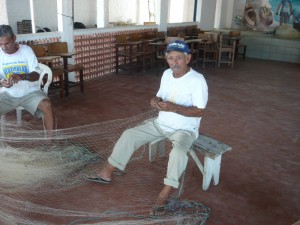 É preciso salientar, contudo, que nem todos pescadores pensam assim. Como nos contou a professora Beatrice Padovani Ferreira do Departamento de Oceanografia da UFPE, o Projeto Recifes Costeiros a princípio, e o IRCOS em seguida, não serviu apenas para conservação e maior compreensão da natureza. Um dos seus efeitos colaterais foi a descoberta de talentos científicos dentro da própria comunidade em Tamandaré. Foi assim que Edvaldo (Nino) Costa passou de peixeiro para professor universitário, Alberto Santos de cortador de cana e pescador, para biólogo e presidente do COMDEMA e Manoel Pedrosa de estagiário para Diretor do IRCOS.
É preciso salientar, contudo, que nem todos pescadores pensam assim. Como nos contou a professora Beatrice Padovani Ferreira do Departamento de Oceanografia da UFPE, o Projeto Recifes Costeiros a princípio, e o IRCOS em seguida, não serviu apenas para conservação e maior compreensão da natureza. Um dos seus efeitos colaterais foi a descoberta de talentos científicos dentro da própria comunidade em Tamandaré. Foi assim que Edvaldo (Nino) Costa passou de peixeiro para professor universitário, Alberto Santos de cortador de cana e pescador, para biólogo e presidente do COMDEMA e Manoel Pedrosa de estagiário para Diretor do IRCOS.
It is important to point out that not all fishermen think this way. As Beatrice Padovani Ferreira, a professor at the Department of Oceanography of the Federal University of Pernambuco (UFPE), told us, the Coastal Reefs Project, initially, and IRCOS later, did more than promote conservation and greater understanding of nature. One of its side effects was the discovery of scientific talents within the community of Tamandaré itself. That is how Edvaldo (Nino) Costa went from being a fishmonger to becoming a university lecturer; Alberto Santos went from sugarcane cutter and fisherman to biologist and president of the COMDEMA and Manoel Pedrosa, from former intern to Director of IRCOS.
Contudo, a expectativa de reabertura da área para pesca mesmo após seu comprovado sucesso em termos de conservação demonstra que uma parte da comunidade ainda não aceita a reserva e não compreende sua importância para a manutenção do equilíbrio ecológico da região. Isto põe em risco o trabalho desenvolvido dentro da área preservada e aumenta o os custos de fiscalização.
Expectations towards reopening of the area for fishing, even after proven success in terms of conservation show, however, that part of the community still does not accept the reserve and does not grasp its importance for maintaining the region’s ecological balance. This puts the work carried out within the preserved area at risk and raises the monitoring costs.
É ai que o projeto de capacitação do IRCOS, apoiado pela SOS Mata Atlântica e Avina entra. É uma tentativa de criar uma alternativa à pesca a partir da exploração do entorno da área da reserva fechada.
That is where the training program by IRCOS, with support from SOS Mata Atlântica and Avina comes in. It is an attempt to create an alternative to fishing, by promoting tourism activities in the reserve’s surroundings.
O efeito de conservação da área protegida transbordou seus limites geográficos. Como dizem por aqui: _ “os peixes não conhecem os limites da reserva”, e os recifes de corais também não. Assim é que, não apenas a área da reserva fechada, mas também seu entorno, recuperou a beleza de seus corais e serve hoje de habitat para diversos animais e vegetais marinhos que antes não mais existiam ali.
The conservation effects of the protected areas have overcome its geographical limits. As they say around here “the fish do not know the reserve’s limits” and neither do the coral reefs. Consequently, not only the reserve, but also its surroundings have recovered the beauty of their corals and serve as habitat to several marine animals and plants that had previously disappeared.
O IRCOS trabalha com a comunidade para desenvolver e organizar este grande potencial turístico. Nos contou Manuel Pedrosa, diretor do Instituto, que para tanto foram desenvolvidas algumas atividades.
IRCOS works alongside the community to develop and organize this important potential or tourism. Manuel Pedrosa, director of the Institute, told us that several activities were created in order to achieve this goal.
- Identificou-se quais são as atividades turísticas de baixo impacto com potencial econômico: delimitaram-se trilhas para mergulhadores, piscinas naturais para visitação, etc..
- Ofereceu-se curso de capacitação de guia locais incluindo conhecimentos científicos e técnicos sobre a fauna e a flora do local, atividades de menor impacto ambiental entre outros.
- Apóia-se tecnicamente a criação de uma cooperativa, a cooperativa Náutica Ambiental, visando a auto-gestão, pelos próprios guias, da exploração turística da região e o apoio da comunidade local para fiscalização da área reservada.
- Tourism activities of low environmental impact and with economic value were identified: diving trails, natural reef pools, etc.
- Courses were offered to train local guides and pass on scientific and technical knowledge on the local fauna and flora, activities with low environmental impact and others.
- Technical support for the development of a cooperative – Nautica Ambiental (Environmental Nautic), with the purpose of managing the region’s tourism by the guides themselves and supporting the monitoring of the reserve.
Visa-se com isto não só uma exploração econômica ordenada e de baixo impacto da área do entorno da reserva fechada, mas também aumentar o número de pessoas na comunidade que compreendem que esta área, se preservada, pode trazer mais benefícios a curto e a longo prazo do que se aberta. Quanto mais pessoas levarem a reserva em suas cabeças e corações, mais fácil se tornará a fiscalização da área.
Its goal is not only an orderly, low impact, economic exploration of the reserve’s surroundings, but also an increase in the number of people in the community that understand that this area, if preserved, may bring more (and longer-term) benefits than if it is reopened. The more people hold the reserve in their minds and hearts, the easier it will be to watch over that area.
O projeto do IRCOS é um primeiro passo, mas ainda há muitas dificuldades a serem enfrentadas. Apenas 24 pescadores, em torno de 5-10 % do total de pescadores do município, aderiram a idéia da cooperativa para exploração turística do entorno. Alguns pescadores temem que esta iniciativa é uma tentativa de aumentar a área preservada e preferiram ficar de fora.
The IRCOS project is a first step but there are still many obstacles ahead. Only 24 fishermen – around 5-10% of the total local fishing community – have adhered to the idea of the cooperative (link) for touristic exploration of the surroundings. Some fishermen fear that it is an attempt to increase the area of conservation and prefer to stay out.
A expectativa do instituto é que na medida em que o turismo se desenvolva e se mostre como importante alternativa econômica para região, um maior número de pescadores escolherá desenvolver a atividade de menor impacto ambiental e compreenderá que é possível viver do mar sem destruir a natureza!
The institute’s expectation is that as tourism grows and begins to show itself as an important economic alternative for the region, a greater number of fishermen will choose to carry out activities with lower impact and understand that it is possible to live off the sea without exploiting nature!
—
Para fazer passeios como o que fizemos contate a Cooperativa Náutica: nauticaambiental@hotmail.com
Contact the Cooperative Náutica to schedule trips like the ones we did: nauticaambiental@hotmail.com
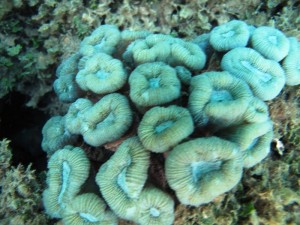
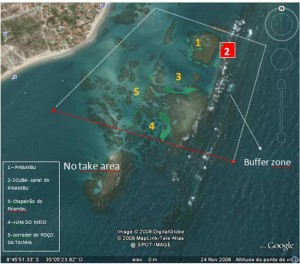

Fantástica iniciativa! Uma verdadeira parceria entre a universidade, órgãos ambientais e os pescadores!
[…] Visa-se com isto não só uma exploração econômica ordenada e de baixo impacto da área do entorno da reserva fechada, mas também aumentar o número de pessoas na comunidade que compreendem que esta área, se preservada, pode trazer mais benefícios a curto e a longo prazo do que se aberta. Quanto mais pessoas levarem a reserva em suas cabeças e corações, mais fácil se tornará a fiscalização da área.O projeto do IRCOS é um primeiro passo, mas ainda há muitas dificuldades a serem enfrentadas. Apenas 24 pescadores, em torno de 5-10 % do total de pescadores do município, aderiram a idéia da cooperativa para exploração turística do entorno. Alguns pescadores temem que esta iniciativa é uma tentativa de aumentar a área preservada e preferiram ficar de fora.A expectativa do instituto é que na medida em que o turismo se desenvolva e se mostre como importante alternativa econômica para região, um maior número de pescadores escolherá desenvolver a atividade de menor impacto ambiental e compreenderá que é possível viver do mar sem destruir a natureza!”Fonte: Blogue Suficiente – 13 de Março de 2010 […]